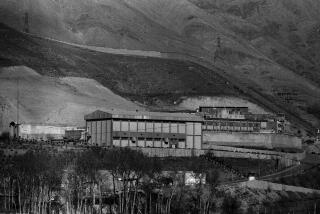U.S. turns over Tariq Aziz, other members of Saddam Hussein regime to Iraqi custody
- Share via
Reporting from Baghdad — The United States has handed over 29 members of Saddam Hussein’s government to Iraqi custody in recent weeks, including Tariq Aziz, the urbane, cigar-chomping official who served as the regime’s global spokesman, Iraqi officials and Aziz’s relatives said Wednesday.
The U.S. military confirmed that it transferred 26 former regime officials Monday and three others last month. It added that it continued to hold eight high-ranking members of Hussein’s government and his ruling Baath Party.
Both Aziz’s son and the Iraqi government said the former foreign minister and deputy prime minister has in an Iraqi prison since Monday.
His son, Ziad Aziz, said his father, who suffers from heart disease and diabetes, called him Wednesday and complained that he was now being held in a tiny cell and deprived of his medications. His son said the former official described the situation as “hard circumstances.”
“He hasn’t taken his medicine in three days. There’s no place to sit. He hasn’t seen a doctor,” Ziad Aziz said. He added that his father has been in a wheelchair in recent months after suffering a stroke. A medical report sent to the family by the International Committee for the Red Cross listed Aziz as also suffering from dementia and slurred speech.
Iraq’s deputy justice minister, Busho Ibrahim, denied that Aziz or any other detainees were being mistreated.
“This is street talk,” Ibrahim said. “The Ministry of Justice doesn’t have anything to hide, whether with former regime officials or former terrorists. Each has his rights and [the ministry has] duties to fulfill according to the international standards.”
Iraq’s detention facilities have been plagued by poor living conditions and allegations of abuse by guards. The justice, defense and interior ministries have implemented human rights inspections, but violations still occur. A U.N. human rights report released last week raised concern about abuses committed against detainees.
Tariq Aziz first gained notoriety in 1990 after Iraq’s invasion of Kuwait. He continued to promote Hussein’s views to the international community in the run-up to the U.S.-led invasion in 2003. Fluent in English and well-educated, the former foreign minister came to symbolize Hussein’s regime in the West. He was Iraq’s senior-most Christian official.
In March 2009, an Iraqi court sentenced him to 15 years in prison for his role in the 1992 execution of 42 merchants who had been accused of price-fixing. He received another seven-year sentence in August 2009 for the displacement of Kurds in 1980.
In addition to the 29 detainees handed over by the Americans, Ibrahim said 26 other high-ranking former regime officials had been transferred to Iraqi custody about eight months ago.
The latest transfers come ahead of the end of American control of Camp Cropper at Baghdad’s international airport, the sole remaining U.S. prison facility in Iraq. On Thursday, the U.S. military will hand over a final 1,600 detainees, while another 200 prisoners will be held under joint Iraqi-U.S. custody, Ibrahim said.
The shutdown of U.S. detention facilities marks a major step as American forces wind down their formal combat mission in Iraq and reduce their troops to 50,000 by the end of August. All remaining U.S. soldiers are scheduled to leave Iraq by the end of 2011.
The United States will continue to hold in joint custody with the Iraqi government eight high-ranking members of the old regime, including Hussein’s half-brothers Watban Ibrahim Hassan and Sabawi Ibrahim Hassan. Both men have been sentenced to death by Iraqi courts.
The most controversial case remains that of Hussein’s former defense minister, Sultan Hashim Ahmad Jabburi Tai. Jabburi Tai was sentenced to death in 2007 for his role as a general in the north during the Hussein regime’s 1980s Anfal military campaign against the Kurds.
Jabburi Tai has been spared execution because Iraqi President Jalal Talabani, himself a Kurd, has refused the orders. Talabani has argued that Hashim should be spared for his contacts with the Iraqi opposition before 2003. It has long been rumored that Jabburi Tai helped to stand down the Iraqi army during the U.S. military invasion.
But many Shiite leaders, including Prime Minister Nouri Maliki, have pushed for his execution.
Ibrahim hinted that the Iraqi authorities were pushing for Jabburi Tai and the remaining seven regime officials to be transferred over as soon as possible.
“There are no negotiations,” the deputy justice minister said. “Whoever we want, we just inform the American side. We are running Iraq right now. The Americans are supporting us.”
Hamid is a Times staff writer.
More to Read
Sign up for Essential California
The most important California stories and recommendations in your inbox every morning.
You may occasionally receive promotional content from the Los Angeles Times.











